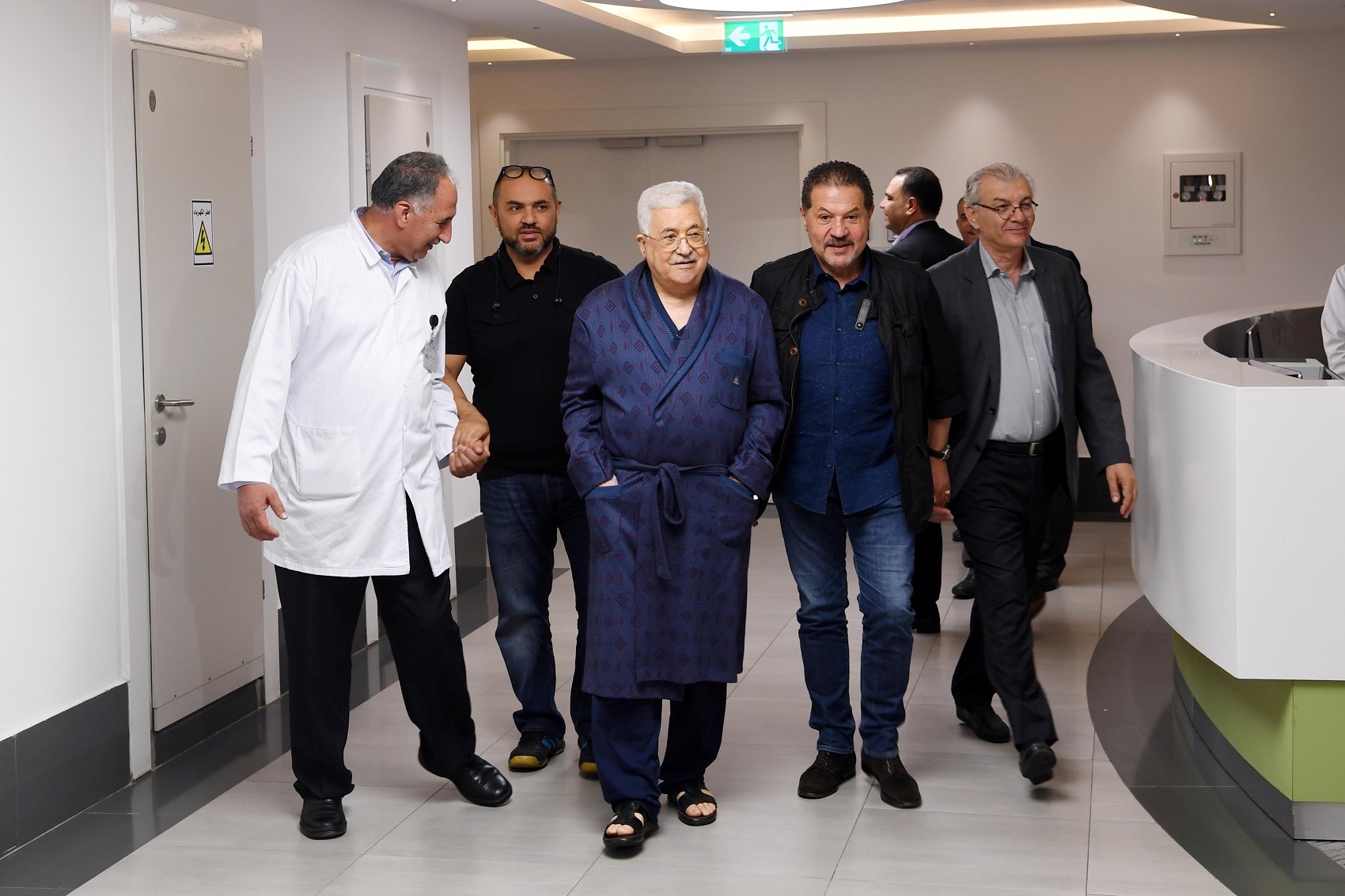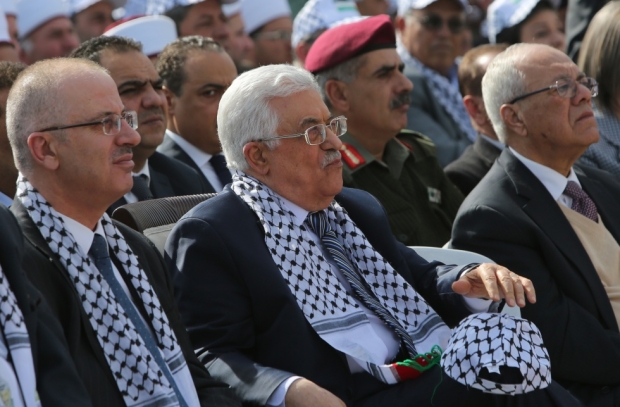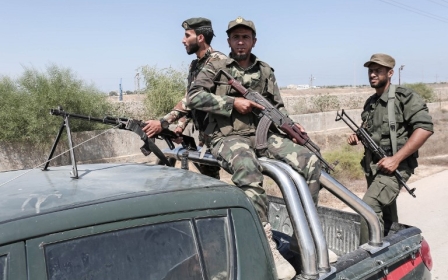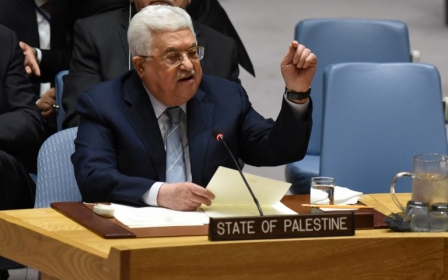Abbas illness sparks succession race for Palestinian presidency

RAMALLAH, Occupied West Bank - On record, Palestinian officials are keen to play down President Mahmoud Abbas’s admission to hospital for pneumonia, stressing it is business as usual in Ramallah's halls of power.
Behind the scenes, it's a different story. The 82-year-old’s condition now appears so serious, that those same Palestinian officials are scrambling to prepare for his succession.
Abbas is no stranger to hospitals – the chain-smoking octogenarian has been admitted for various ailments in recent years – but his latest illness is reportedly life threatening.
And it's not just pneumonia. Sources at the hospital in Ramallah told Middle East Eye Abbas needs treatment for various conditions, gravely affecting his ability to govern.
Now the question of his replacement, long a hot topic for Palestinians and the region, has become critical, as a number of candidates begin jockeying for power.
Medical sources told MEE that Abbas has received a number of Palestinian officials and ministers at the hospital, and held a 17-minute-long telephone conversation with Turkish President Recep Tayyip Erdogan.
However, in Palestinian politics, which is rife with divisions, competing and overlapping ruling bodies, and outsider influence, finding a replacement for the president is no simple task.
Since taking the presidency in 2005 after the death of longtime leader Yasser Arafat, Abbas has held a firm grip on the levers of power in several key Palestinian institutions.
As head of the Palestinian Authority, Palestine Liberation Organisation and the Fatah party, Abbas’s resignation would leave a huge vacuum at the top of three major ruling bodies, with no clear candidate to replace him.
Law no guide
According to Palestinian law, once a president leaves office for any reason, the speaker of the Palestinian Legislative Council replaces them for 60 days, during which time presidential elections must be held.
But as things stand, this scenario appears impossible, as a massive schism between Fatah and Hamas, the two major Palestinian parties, has paralysed the political system.
'Now we have no system at all'
- PLO official
Bitter rivals, since the 2006 Palestinian elections Hamas and Fatah have split the PA – the Palestinian proto-state’s principal ruling body.
Fatah controls the PA government and rules the areas of the occupied West Bank under Palestinian control, while the Hamas movement holds the Gaza Strip.
The 2006 split also put an end to the PLC’s role as the PA’s parliament, as the election handed the majority of seats to Hamas.
Not only does Fatah no longer consider the PLC to be the parliamentary body representing Palestinians in the West Bank and Gaza, the idea of its speaker, Hamas official Aziz Dweik, holding the powers of the presidency – however temporarily – is anathema to the party.
With the Fatah-Hamas schism standing squarely in the way of a presidential succession following the letter of the law, Palestinian officials are now looking at new ways to fill the role.
No hierarchy, no majority
In rejecting the PLC, the Fatah-controlled PLO has instead recognised the Palestinian National Council as the legitimate parliament.
The PNC served as a legislative body for all Palestinians within historic Palestine and the diaspora until the Oslo Accords set up the PLC in 1993 as part of attempts to create a Palestinian state.
One way for the PLO to circumvent the Dweik issue would be to recognise PNC Speaker Salim Zanoun in his stead, until Fatah agrees on its candidate to replace Abbas.
A consensus candidate may be out of reach for Fatah, however.
“It’s not easy for Fatah to agree on one candidate,” a PLO Executive Committee member, who spoke on the condition of anonymity because of the sensitivity of the issue, told Middle East Eye.
“The problem is Fatah has no number two, everyone in the Central Committee considers himself number two.”
'The problem is Fatah has no number two'
- PLO Executive Committee member
And when Fatah leaders do unite, they do so only in groups of two or three, creating a collection of coalitions that leaves the leadership with no majority and no visible hierarchy.
“When Arafat passed away, we had a speaker to replace him and we had a deputy to Arafat in the PLO, but now we have no system at all,” a PLO official told MEE, also speaking anonymously.
Hamdallah in prime position
Such a deadlock could open the door for Prime Minister Rami Hamdallah to rise to the presidency.
The prime minister could use the period of political vacuum to run the PA as de facto president and gradually win Fatah approval to replace Abbas.
Sources in the PLO told MEE this scenario is favoured by General Intelligence Service chief Majed Faraj and other leaders in the security services, who will support the prime minister to ensure immediate stability.
One of Hamdallah’s key strengths as prime minister is that he controls many of the PA’s resources.
This also makes him an attractive prospect for the security leaders, who need Hamdallah to open the purse strings to keep their forces and departments running smoothly.
However, according to the sources, Faraj and the security services heads also see backing Hamdallah as a way to block influential Fatah figure Jibril Rajoub, who heads the Palestinian Football Association and once led the PA’s Preventative Security force in the West Bank.
Faraj, a longtime confidante of Abbas and the only security chief with a political role, expects Rajoub to marginalise him if he comes to power, the sources said.
Israel's influence
Moves to begin placing Hamdallah into a position of strength have already begun, the sources told MEE, with some officials talking the premier up to Israel as the strongest candidate.
Israel is expected to have a key role in Abbas’ succession.
It has significant influence on the PA and hands the Palestinian body two thirds of its budget through tax clearances that Israel collects every month.
Winning Israel’s approval, therefore, would be a significant boon for Hamdallah.
According to Mohammed Younis, an analyst and commentator for pan-Arab newspaper al-Hayat, Hamdallah met recently with Israeli Finance Minister Moshe Kahlon and then-military coordinator Yoav Mordechai in an effort to sure up support for his succession.
“His message in these meetings was: ‘I can cooperate and stabilize the situation,’” Younis told MEE.
Power, patronage and animosity
Hamdallah’s succession to the presidency is no foregone conclusion, though.
Some expect Faraj, a prominent figure in negotiations with the US, Israel and Hamas, to replace Abbas with support from international and regional powers.
But sources in the PLO told MEE this is unlikely, as Faraj is not a member of the Fatah Central Committee, the movement’s top leadership body.
And while Israel is expected to play a key role in the succession, so too are Egypt and Jordan, who may have their own ideas of who should become president.
Younis said that Egypt, for example, doesn’t hide its support for former foreign minister Nasser al-Qidweh.
Qidweh, a former ally of Abbas’s arch-rival Mohammed Dahlan and Arafat’s nephew, is positioned in the middle ground of Palestinian politics, which some commentators see as highly advantageous.
An eruption of violence should not be ruled out either.
According to sources, some Fatah leaders are accumulating weapons and busy building alliances, wary of losing stature should a rival rise to prominence.
'There is no way Rajoub and Tirawi would let Hamdallah take over'
- Mohammad Younis, political analyst
The animosity between many of Fatah’s top officials is no secret, and Younis warns that in the absence of strong leadership and a clear method for the transition of power, bloody battles could erupt in the wake of Abbas’ resignation.
And though Hamdallah may have strong backing in some quarters, Rajoub and former intelligence chief Tawfiq Tirawi are thought to be prepared to put their old rivalry aside to do anything possible to stop the prime minister’s accession.
“There is no way Rajoub and Tirawi would let Hamdallah take over,” Younis said.
This article is available in French on Middle East Eye French edition.
New MEE newsletter: Jerusalem Dispatch
Sign up to get the latest insights and analysis on Israel-Palestine, alongside Turkey Unpacked and other MEE newsletters
Middle East Eye delivers independent and unrivalled coverage and analysis of the Middle East, North Africa and beyond. To learn more about republishing this content and the associated fees, please fill out this form. More about MEE can be found here.






